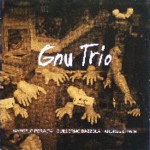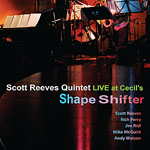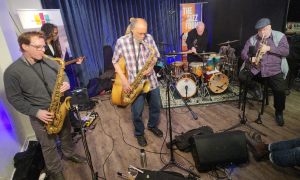Home » Jazz Articles » Live Review » Wynton Marsalis with Jazz at Lincoln Center Orchestra at...
Wynton Marsalis with Jazz at Lincoln Center Orchestra at the Kimmel Center
Strikingly, the entire evening was highlighted by Joe Temperley's haunting bass clarinet version of Duke Ellington's 'Single Petal of a Rose.'
Wynton Marsalis, Music Director
The Kimmel Center for the Performing Arts
March 20, 2009
Wynton Marsalis and the Lincoln Center Jazz Orchestra made a return visit to the Kimmel Center with a full-house crowd on hand and an early Spring March wind in the air. Marsalis quickly indicated the underpinnings of the performance by saying, "We're just going to swing." Indeed, the group gave a lively and sometimes moving performance of heated big band arrangements punctuated by Marsalis' light-hearted remarks to the audience.
The first set began with Jackie McLean's intense "Appointment in Ghana," arranged by Marsalis in a "herd-like" Woody Herman style alternating with a slow, tense, and brooding motif. The piece featured two Marsalis trumpet solos, the second with his signature plunger mute. This was followed by Marsalis' own "Itsy Bitsy Spider," based on the nursery rhyme. The laconic walk tempo was humorously evocative of an awesome spider, and with Erica VonKleist's solo on flute and Chris Crenshaw's plunger-muted trombone the piece acquired a Dixieland flavor, by the end echoing the Preservation Hall Jazz Band.
Thelonious Monk's "Bayada," arranged by the bassist, Carlos Henriquez, was done in Latin rhythm, and constituted the least Monkish Monk this reviewer has ever heard. Excellent solos by Marcus Printup on trumpet; Crenshaw on trombone, and Henriquez on bass, saved this otherwise lackluster version of a Monk composition from being a candidate for extinction. Further compensation came with a beautiful version of Benny Carter's ballad: "Again and Again," which Marsalis informed us was Carter's final composition, written in 2000. Sherman Irby shone magnificently on alto sax, with a nothing-short-of-gorgeous sound. The set concluded with Marsalis' "Jump Start," composed for a ballet choreographed by Twyla Tharp with a melody inspired by Gershwin's "Lady Be Good." This number did indeed "jump," again with the Herman Thundering Herd feel.
Following the intermission, the group dug in with an Oliver Nelson arrangement of "Down by the Riverside." The traditional tune became increasingly relaxed and swinging, with solos by Elliot Mason on trombone and Freddie Hendrix on trumpet, a lively interlude with drummer Ali Jackson on tambourine, and then a trumpet solo by Printup. Trumpeters Hendrix and Mason then engaged in a contrapuntal back and forth conversation, and the piece concluded with the hallowed sound quality of unison saxophones.
Ted Nash's version of Lee Morgan's sweet ballad, "Ceora" was beautifully orchestrated by Nash, and featured a fine alto solo by vanKleist,. a Morgan-style trumpet solo by Ryan Kisor, and Erroll Garner-esque piano variations by Dan Nimmer.
Then Marsalis reflected on the great tenor sax players, leading up naturally to John Coltrane, who experimented intensively with harmonic overtones on tenor saxophone near the end of his career. This commentary presaged a piece called "Harmonique," which incorporated, to say the least, a rather strange-sounding sax section using those aforementioned overtones, and ending in a saxophone duel, with Victor Goines and Walter Blanding, Jr. at either end of the sax section trading solos.
Strikingly, the entire evening was highlighted by Joe Temperley's haunting version of Duke Ellington's "Single Petal of a Rose," with Ellington alumnus Temperley offering a plaintive bass clarinet recitative accompanied by piano. The Ellingtonian evocation was so profound that it drew a well-deserved standing ovation from the audience, a rare occurrence proffered for a single performance.
The group concluded with Kenny Dorham's "Stage West," arranged by Vincent Gardner, with the latter also offering a very fine fast-paced double-tongued trombone solo, probably the most creative solo of the evening, and one which would have had J.J. Johnson smiling.
The second set was even livelier and more interesting than the first. This is a formidable group of musicians led by one of the pre-eminent figures in the jazz world. The only down side was one that often characterizes Marsalis' work. He has such a love of tradition—and surely no one can (nor should) fault him for this—that many of the modern advances get short shrift. Marsalis should perhaps be reminded that, overtone harmonics notwithstanding, there have been numerous important and seminal advances in jazz since Dixieland, swing, and bebop. But conservatism has its place in music, and Marsalis has honed a Jazz at Lincoln Center Orchestra that can easily take its place among the best of its genre.
Tags
PREVIOUS / NEXT
Wynton Marsalis Concerts
Support All About Jazz
 All About Jazz has been a pillar of jazz since 1995, championing it as an art form and, more importantly, supporting the musicians who make it. Our enduring commitment has made "AAJ" one of the most culturally important websites of its kind, read by hundreds of thousands of fans, musicians and industry figures every month.
All About Jazz has been a pillar of jazz since 1995, championing it as an art form and, more importantly, supporting the musicians who make it. Our enduring commitment has made "AAJ" one of the most culturally important websites of its kind, read by hundreds of thousands of fans, musicians and industry figures every month.

























